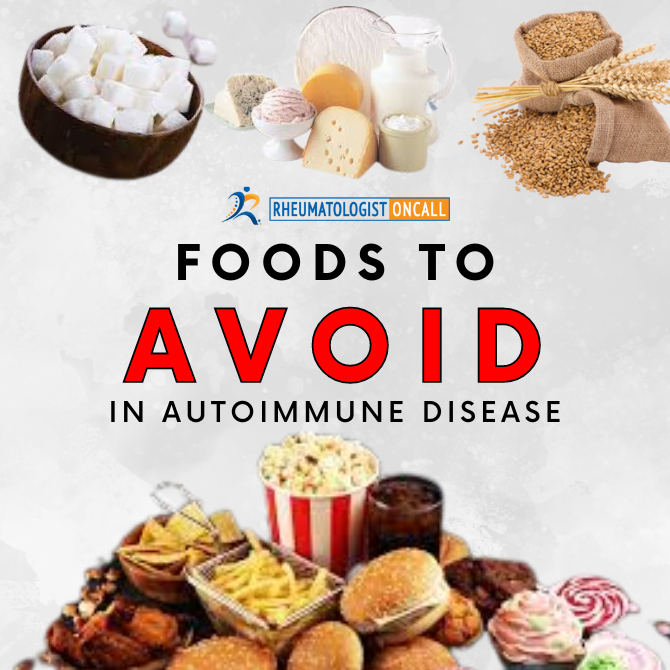SHARE
Food plays a significant role in our overall health, and for individuals with autoimmune diseases, certain foods can either trigger inflammation or worsen symptoms. In this comprehensive guide, we’ll delve into the top eight foods to avoid if you have an autoimmune disease. From processed foods and sugar to gluten-containing grains and nightshade vegetables, we’ll explore the reasons behind their potential harm and offer alternative options for a healthier lifestyle.
#1: Processed Foods and Fast Food: Choosing Nutrient-Dense Alternatives
Processed foods and fast food are notorious for their high content of artificial ingredients, unhealthy fats, and excessive sodium. These factors contribute to inflammation and can intensify symptoms for those with autoimmune diseases. Opting for whole, unprocessed foods and preparing homemade meals can provide the necessary nutrients for your body while reducing the risk of triggering inflammation. Discover the benefits of making this simple switch to support your overall well-being.
#2: Sugar: Unveiling the Hidden Dangers
Sugar consumption has been linked to increased inflammation in the body, which can worsen symptoms for individuals with autoimmune diseases. Moreover, excessive sugar intake can lead to weight gain and increase the risk of metabolic syndrome and type 2 diabetes, conditions often associated with higher autoimmune disease risk. We’ll explore the detrimental effects of added sugars and provide strategies for reducing your sugar intake, allowing you to take control of your health and manage your autoimmune condition more effectively.
#3: Artificial Sweeteners: Navigating the “Sugar-Free” Trap
Artificial sweeteners, commonly found in diet sodas and sugar-free products, may seem like a healthier alternative to sugar. However, these sweeteners can disrupt gut health, trigger inflammation, and contribute to cravings for more sweet foods. We’ll debunk the myth surrounding artificial sweeteners and guide you toward natural, healthier alternatives that won’t compromise your well-being.
#4: Salt: The Hidden Culprit of Inflammation
High-sodium foods, such as processed meats, canned soups, and salty snacks, can promote water retention, raise blood pressure, and contribute to inflammation. We’ll explore the impact of excessive salt consumption on autoimmune diseases and offer tips on reducing your sodium intake. By embracing whole foods and flavoring your meals with herbs and spices instead of salt, you can support your body’s natural balance and reduce the risk of exacerbating your autoimmune symptoms.
#5: Gluten-Containing Grains: Unraveling the Connection
Gluten, found in wheat, barley, and rye, can pose challenges for individuals with autoimmune diseases. It has been linked to inflammation and damage to the intestinal lining, particularly for those with celiac disease. We’ll delve into the complexities of gluten sensitivity, discuss the potential effects on autoimmune conditions, and provide gluten-free alternatives to help you navigate your dietary choices with confidence.
#6: Dairy Products: Assessing the Impact
Dairy products, such as milk, cheese, and yogurt, have been associated with inflammation and can worsen symptoms like joint pain and digestive issues for some individuals. We’ll explore the ongoing debate surrounding dairy consumption and autoimmune diseases, discuss the potential mechanisms behind these effects, and offer dairy-free alternatives that can provide the necessary nutrients without triggering unwanted symptoms.
#7: Excessive Alcohol: Balancing the Risks
While small to moderate alcohol consumption may have potential health benefits, excessive alcohol intake can have negative effects on the immune system and overall health. We’ll navigate the complex relationship between alcohol and autoimmune diseases, discussing the impact of alcohol on inflammation, sleep patterns, and nutrient deficiencies. By adopting a mindful and moderate approach to alcohol consumption, you can make informed choices that support your well-being.
#8: Nightshade Vegetables: Understanding Individual Sensitivities
Nightshade vegetables, including tomatoes, peppers, potatoes, and eggplants, contain a compound called solanine, which may contribute to inflammation and joint pain for some individuals with autoimmune diseases. We’ll delve into the concept of individual sensitivities and guide you through a process of self-exploration to determine whether these vegetables affect your symptoms. Armed with this knowledge, you can make informed decisions about including or excluding nightshade vegetables from your diet.
Conclusion: Personalizing Your Approach to Autoimmune Disease Management
Managing autoimmune diseases requires a personalized approach that considers individual sensitivities and responses to various foods. While these eight foods are commonly associated with triggering inflammation and exacerbating symptoms, it’s essential to listen to your body, track your responses, and consult with a specialized physician or nutritionist for tailored to your specific needs, you can take control of your autoimmune personalized guidance. By making informed choices and adopting a diet disease management and enhance your overall well-being.

Rheumatologist OnCall: Expert Guidance for Autoimmune Disease Management
At Rheumatologist OnCall, we understand the unique challenges faced by individuals with autoimmune diseases. Our team of experienced rheumatologists is dedicated to providing personalized, integrative care to support your journey toward optimal health. Whether you need assistance in identifying trigger foods, developing a customized nutrition plan, or managing your autoimmune condition, we are here to help. Visit our website to learn more about our services and schedule an appointment from the comfort of your home.
Incorporating these dietary recommendations into your lifestyle can have a profound impact on managing your autoimmune disease. Remember, each step you take toward making informed dietary choices brings you closer to a healthier, symptom-free life. If you found this information valuable, remember to share this article with others who may benefit from it.
Together, let’s take charge of our health and overcome the challenges of autoimmune diseases with knowledge, support, and personalized care.
Thank you for reading!














